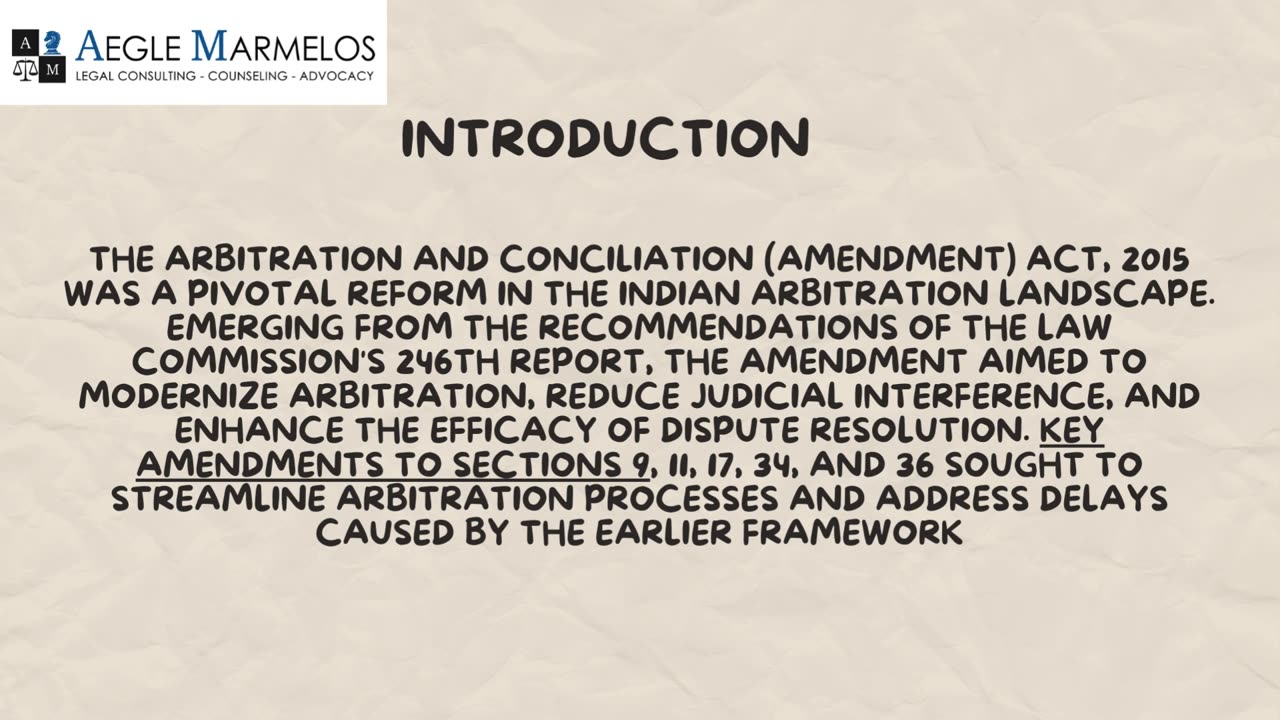Premium Only Content

Arbitration and Conciliation Amendment Act 2015 Key Insights
The Arbitration and Conciliation (Amendment) Act, 2015 was a landmark reform in India’s arbitration landscape, aimed at streamlining processes, reducing delays, and minimizing judicial interference. Rooted in the Law Commission's 246th Report, the Act amended key provisions like Sections 9, 11, 17, 34, and 36, emphasizing efficiency and procedural clarity.
A central debate emerged regarding its applicability—whether prospective or retrospective. Section 26 clarified that the amendments apply prospectively to arbitral proceedings initiated post-October 23, 2015, while court proceedings commenced after the date would follow the amended provisions. The Supreme Court in BCCI v. Kochi Cricket (2018) held that the amendments abolishing automatic stays under Section 36 could apply retrospectively to court proceedings.
Subsequent cases like Ellora Paper Mills (2022) and Shree Vishnu Constructions (2023) provided nuanced interpretations, gradually consolidating the framework. Recent decisions affirm parties' flexibility to adopt the amended provisions even for older arbitrations, fostering adaptability.
The Act underscores India's commitment to pro-arbitration reforms, building trust among domestic and global stakeholders in its dispute resolution mechanisms.
To Know more: https://www.amlawfirm.in/post/understanding-the-arbitration-and-conciliation-amendment-act-2015-prospective-or-retrospective-i
-
 25:30
25:30
SB Mowing
1 day agoFrom Overgrown to OVERJOYED - Busy Mom and her Kids can Enjoy the Yard Again
12.2K10 -
 41:15
41:15
Stephen Gardner
1 day ago🔥Dems PANIC as Trump orders raids on Sanctuary Cities and Border!
35K55 -
 1:52:41
1:52:41
Game On!
11 hours ago $1.45 earnedTom Brady PROVES he is the greatest NFL minority owner in league history!
14.5K4 -
 2:11:51
2:11:51
Chicks in the Office
1 day agoBlake Lively & Justin Baldoni On-Set Footage, Oscar Noms + Teddy Swims Interview
13.4K2 -
 11:37
11:37
BitcoinBros
1 day agoU.S. Bitcoin Reserve Is STARTING NOW!!! - Bitcoin & $MSTR Update 2025
8.92K2 -
 2:55:31
2:55:31
RG_GerkClan
3 hours ago🔴LIVE - I'm Back! What a Week, Lets Dominate - Escape From Tarkov - Gerk Clan
10.7K -
 5:18:45
5:18:45
TonYGaMinG
7 hours ago🟢LIVE NOW - DAYZ with @BeemoGG and @VladsGamingCartel #RumbleGaming
29.5K2 -
 29:05
29:05
The Why Files
5 days agoNuclear Powered Evolution | The Wolves of Chernobyl Reveal Human Potential
47.6K46 -
 4:23:03
4:23:03
Akademiks
17 hours agoASAP Rocky Case has Begun . He's facing 24 years for SH**ting his friend!
133K65 -
 4:03:43
4:03:43
Benny Johnson
18 hours ago🚨Pete Hegseth Senate Confirmation Vote Happening LIVE NOW | MAJOR Shakeup at Pentagon
349K730